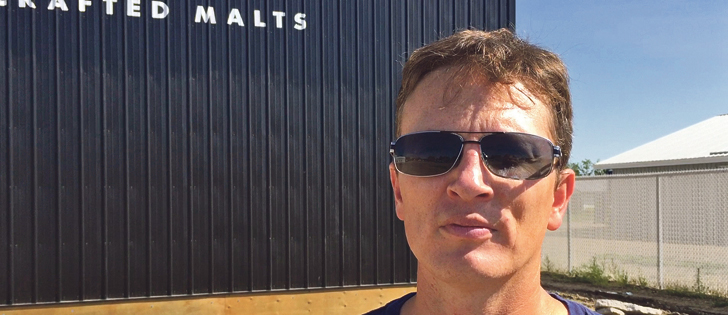Matt Enns and his family have been growing high quality malting barley in the Saskatchewan River Valley north of Saskatoon for more than 30 years.
However, starting this year, they’re taking their interest in barley to a whole new level.
Over the next few months, Enns will be putting the finishing touches on a new malting plant that aims to fill a niche in the craft malt market.
“Basically what we saw was an uptick in the craft brewing scene in North America and Saskatchewan … and a disconnect between the small craft brewing industry and the large multi-national maltster in terms of their scale of production,” said Enns.
“The large maltsters are creating products that are destined for big brewing companies like Anheuser Busch…. Their whole game plan hinges on being able to produce a consistent, generic product at large volume….
“But the craft brewer wants to do something entirely different. They want to create products that are unique … so they’re kind of excited about having a maltster that will create products aimed specifically at (their) market.”
Maker’s Malt, located at Rosthern, Sask., is positioned to become Saskatchewan’s first craft maltster.
Read Also

Farming Smarter receives financial boost from Alberta government for potato research
Farming Smarter near Lethbridge got a boost to its research equipment, thanks to the Alberta government’s increase in funding for research associations.
The company will add value to locally produced malting barley by processing small batches of base and specialty malts.
Right now, many craft brewers interested in brewing unique, specialty beers are unable to source specialty malts in Canada.
In many cases, the specialty malts they use are imported from Europe.
Maker’s is hoping to change that.
Enns has already constructed a building that will serve as a base for operations.
Later this month, he will take delivery of a custom-made steeping vessel from a manufacturer in Wisconsin.
If all goes well, Maker’s will process its first batch of malt barley in September.
Enns said Maker’s will begin shipping finished malts to customers in Saskatchewan and throughout Western Canada.
In time, it will look at exporting finished malt to specialty brewers in the United States and beyond.
The craft brewing industry has been expanding in Canada for several years, but it still hasn’t reached its full potential, Enns said.
Recent statistics suggest that craft brewers command only one or two percent of the Saskatchewan beer market.
In the United States, the figure is closer to 15 percent.
In Saskatchewan, the number of craft brewers has expanded quickly over the past few years, but the number of craft maltsters has not kept pace.
More than a dozen craft brewers and independent brew houses make their own beer in Saskatchewan. Manitoba’s craft beer industry is also poised for significant growth.
Enns began to notice the growth in that sector a few years ago after chatting with craft beer aficionados and friends who were looking for beer with different flavours and profiles.
That’s when the wheels started turning.
The idea ruminated for a few months before Enns and a few business partners decided to take the plunge.
Without a template to follow, Enns designed a small-batch processing facility capable of producing up to four tonnes of finished malt per week.
At start-up, Enns is planning to bring in an experienced maltster from the United States to fine-tune the malting process and work out any bugs in the new system.
Eventually, Enns himself will serve as the plant’s full-time maltster, at least until demand for his products warrants additional staff.
Enns said his farm will continue to sell the vast majority of its annual barley production to the big processors.
But in the end, the opportunity to add value to some of his production while meeting the demands of specialty brewers close to home was simply too great too ignore.
“We’re typically producing great quality malt barley in Saskatchewan, but we’re really not getting full value out of it, in a sense,” he said.
“Right now, our barley goes into a big mix along with barley that’s produced by a thousand other farmers and it creates a generic product. We think our barley can do more than that.”


















